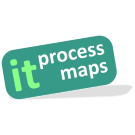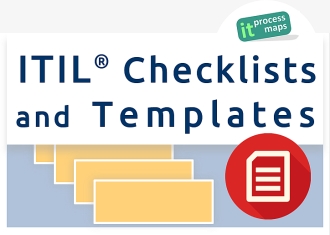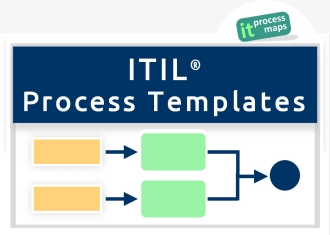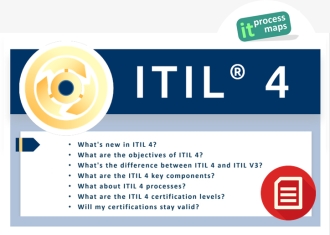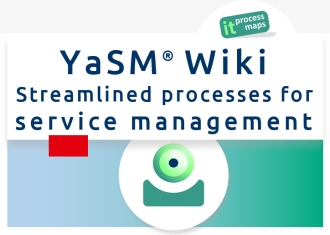ITIL Glossary/ ITIL Terms P: Difference between revisions
Created page with "<seo metakeywords="ITIL glossary definitions acronyms meanings terms words itsm it-service-management P" metadescription="Use this ITIL Glossary to look up the definitions of ..." |
mNo edit summary |
||
| Line 1: | Line 1: | ||
< | <itpmch><title>ITIL Glossary/ ITIL Terms P | IT Process Wiki</title> | ||
<meta name="keywords" content="ITIL glossary definitions acronyms meanings terms words itsm it-service-management P" /> | |||
<meta name="description" content="Use this ITIL Glossary to look up the definitions of ITIL terms starting with the letter P: Pattern of Business Activity (PBA), PIR, ..., Purchase Request." /> | |||
</itpmch> | |||
__NOTOC__ | __NOTOC__ | ||
| Line 13: | Line 16: | ||
|} | |} | ||
The ITIL glossary provides you with definitions for the most important glossary terms and acronyms on the '''IT Infrastructure Library ITIL®''' (ITIL 2011, ITIL V3 & V2) and IT Service Management (ITSM) in alphabetical order.[[ITIL Glossary#Notes|['''1''']]] | The ITIL glossary provides you with definitions for the most important glossary terms and acronyms on the '''IT Infrastructure Library ITIL®''' (ITIL 2011, ITIL V3 & V2) and IT Service Management (ITSM) in alphabetical order.[[ITIL Glossary/_ITIL_Terms_P#Notes|['''1''']]] | ||
[[ITIL Glossary#All ITIL Terms|Look up all terms]] or browse alphabetically: | [[ITIL Glossary#All ITIL Terms|Look up all terms]] or browse alphabetically: | ||
| Line 29: | Line 32: | ||
<p><span id="top"> </span></p> | <p><span id="top"> </span></p> | ||
==ITIL Terms starting with <big>P</big>== | ===ITIL Terms starting with <big>P</big>=== | ||
---- | |||
For quick access, all ITIL terms and definitions starting with "P" are listed below. | For quick access, all ITIL terms and definitions starting with "P" are listed below. | ||
| Line 37: | Line 41: | ||
<p> </p> | <p> </p> | ||
* [[#Pattern of Business Activity (PBA)|Pattern of Business Activity (PBA)]] | *[[#Pattern of Business Activity (PBA)|Pattern of Business Activity (PBA)]] | ||
* [[#PIR|PIR]] | *[[#PIR|PIR]] | ||
* [[#Post Implementation Review (PIR)|Post Implementation Review (PIR)]] | *[[#Post Implementation Review (PIR)|Post Implementation Review (PIR)]] | ||
* [[#Pro-Active User Information|Pro-Active User Information]] | *[[#Pro-Active User Information|Pro-Active User Information]] | ||
* [[#Problem|Problem]] | *[[#Problem|Problem]] | ||
* [[#Problem Categorization|Problem Categorization]] | *[[#Problem Categorization|Problem Categorization]] | ||
* [[#Problem Closure|Problem Closure]] | *[[#Problem Closure|Problem Closure]] | ||
* [[#Problem Identification|Problem Identification]] | *[[#Problem Identification|Problem Identification]] | ||
* [[#Problem Management|Problem Management]] | *[[#Problem Management|Problem Management]] | ||
* [[#Problem Management Report|Problem Management Report]] | *[[#Problem Management Report|Problem Management Report]] | ||
* [[#Problem Manager|Problem Manager]] | *[[#Problem Manager|Problem Manager]] | ||
* [[#Problem Priority|Problem Priority]] | *[[#Problem Priority|Problem Priority]] | ||
* [[#Problem Record|Problem Record]] | *[[#Problem Record|Problem Record]] | ||
* [[#Problem Report|Problem Report]] | *[[#Problem Report|Problem Report]] | ||
* [[#Process and Asset Valuation|Process and Asset Valuation]] | *[[#Process and Asset Valuation|Process and Asset Valuation]] | ||
* [[#Process Architect|Process Architect]] | *[[#Process Architect|Process Architect]] | ||
* [[#Process Architecture|Process Architecture]] | *[[#Process Architecture|Process Architecture]] | ||
* [[#Process Area|Process Area]] | *[[#Process Area|Process Area]] | ||
* [[#Process Assessment Guideline|Process Assessment Guideline]] | *[[#Process Assessment Guideline|Process Assessment Guideline]] | ||
* [[#Process Audit|Process Audit]] | *[[#Process Audit|Process Audit]] | ||
* [[#Process Benchmarking|Process Benchmarking]] | *[[#Process Benchmarking|Process Benchmarking]] | ||
* [[#Process Design|Process Design]] | *[[#Process Design|Process Design]] | ||
* [[#Process Evaluation|Process Evaluation]] | *[[#Process Evaluation|Process Evaluation]] | ||
* [[#Process Evaluation | *[[#Process Evaluation Program|Process Evaluation Program]] | ||
* [[#Process Evaluation Report|Process Evaluation Report]] | *[[#Process Evaluation Report|Process Evaluation Report]] | ||
* [[#Process Maturity Assessment|Process Maturity Assessment]] | *[[#Process Maturity Assessment|Process Maturity Assessment]] | ||
* [[#Process Metric (KPI)|Process Metric (KPI)]] | *[[#Process Metric (KPI)|Process Metric (KPI)]] | ||
* [[#Process Owner|Process Owner]] | *[[#Process Owner|Process Owner]] | ||
* [[#Project Charter|Project Charter]] | *[[#Project Charter|Project Charter]] | ||
* [[#Project Control|Project Control]] | *[[#Project Control|Project Control]] | ||
* [[#Project Coordination|Project Coordination]] | *[[#Project Coordination|Project Coordination]] | ||
* [[#Projected Service Availability (PSA)|Projected Service Availability (PSA)]] | *[[#Projected Service Availability (PSA)|Projected Service Availability (PSA)]] | ||
* [[#Projected Service Outage (PSO)|Projected Service Outage (PSO)]] | *[[#Projected Service Outage (PSO)|Projected Service Outage (PSO)]] | ||
* [[#Project History Log|Project History Log]] | *[[#Project History Log|Project History Log]] | ||
* [[#Project Management (Transition Planning and Support)|Project Management (Transition Planning and Support)]] | *[[#Project Management (Transition Planning and Support)|Project Management (Transition Planning and Support)]] | ||
* [[#Project Manager|Project Manager]] | *[[#Project Manager|Project Manager]] | ||
* [[#Project Plan (Service Transition Plan)|Project Plan (Service Transition Plan)]] | *[[#Project Plan (Service Transition Plan)|Project Plan (Service Transition Plan)]] | ||
* [[#Project Portfolio Status Report|Project Portfolio Status Report]] | *[[#Project Portfolio Status Report|Project Portfolio Status Report]] | ||
* [[#Purchase Order|Purchase Order]] | *[[#Purchase Order|Purchase Order]] | ||
* [[#Purchase Request|Purchase Request]] | *[[#Purchase Request|Purchase Request]] | ||
<p> </p> | <p> </p> | ||
| Line 83: | Line 87: | ||
====Pattern of Business Activity (PBA)==== | ====Pattern of Business Activity (PBA)==== | ||
* Patterns of Business Activity (PBA) are workload profiles describing the demand for particular services. | *Patterns of Business Activity (PBA) are workload profiles describing the demand for particular services. | ||
* PBAs are an important tool used by Demand Management for anticipating and influencing service demand. | *PBAs are an important tool used by Demand Management for anticipating and influencing service demand. | ||
* → ITIL processes, [[ITIL | *→ ITIL processes, [[ITIL Service Strategy|ITIL Service Strategy]] > [[ITIL Demand Management|Demand Management]] | ||
====PIR==== | ====PIR==== | ||
* → [[#Post Implementation Review (PIR)|Post Implementation Review]] | *→ [[#Post Implementation Review (PIR)|Post Implementation Review]] | ||
====Post Implementation Review (PIR)==== | ====Post Implementation Review (PIR)==== | ||
* The Post Implementation Review takes place after a Change has been implemented. | *The Post Implementation Review takes place after a Change has been implemented. | ||
* It determines if the Change and its implementation Project were successful, and identifies opportunities for improvement. | *It determines if the Change and its implementation Project were successful, and identifies opportunities for improvement. | ||
* → [[Checklist Post Implementation Review (PIR)]] | *→ [[Checklist Post Implementation Review (PIR)]] | ||
* → ITIL processes, [[ITIL | *→ ITIL processes, [[ITIL Service Transition|ITIL Service Transition]] > [[Change Management]] | ||
====Pro-Active User Information==== | ====Pro-Active User Information==== | ||
* A notification to users of existing or imminent service failures even if the [[ITIL Roles#User|users]] are not yet aware of the interruptions, so that users are in a position to prepare themselves for a period of service unavailability. | *A notification to users of existing or imminent service failures even if the [[ITIL Roles#User|users]] are not yet aware of the interruptions, so that users are in a position to prepare themselves for a period of service unavailability. | ||
* → ITIL processes, [[ITIL | *→ ITIL processes, [[ITIL Service Operation|ITIL Service Operation]] > [[Incident Management]] | ||
====Problem==== | ====Problem==== | ||
* A cause of one or more Incidents. The cause is not usually known at the time a Problem Record is created. | *A cause of one or more Incidents. The cause is not usually known at the time a Problem Record is created. | ||
* → ITIL processes, [[ITIL | *→ ITIL processes, [[ITIL Service Operation|ITIL Service Operation]] > [[Problem Management]] | ||
====Problem Categorization==== | ====Problem Categorization==== | ||
* → ITIL sub- | *→ ITIL sub-process, [[Problem Management#ITIL Problem Management Prioritization|Problem Categorization and Prioritization]] | ||
====Problem Closure==== | ====Problem Closure==== | ||
* → [[Checklist Closure of a Problem]] | *→ [[Checklist Closure of a Problem]] | ||
* → ITIL processes, [[ITIL | *→ ITIL processes, [[ITIL Service Operation|ITIL Service Operation]] > [[Problem Management]] | ||
====Problem Identification==== | ====Problem Identification==== | ||
* → ITIL sub- | *→ ITIL sub-process, [[Problem Management#Problem Identification|Proactive Problem Identification]] | ||
====Problem Management==== | ====Problem Management==== | ||
* → ITIL processes, [[ITIL | *→ ITIL processes, [[ITIL Service Operation|ITIL Service Operation]] > [[Problem Management]] | ||
====Problem Management Report==== | ====Problem Management Report==== | ||
* A report supplying Problem-related information to the other Service Management processes. | *A report supplying Problem-related information to the other Service Management processes. | ||
* → ITIL processes, [[ITIL | *→ ITIL processes, [[ITIL Service Operation|ITIL Service Operation]] > [[Problem Management]] | ||
====Problem Manager==== | ====Problem Manager==== | ||
* → Roles within ITIL, [[ITIL Roles#Problem Manager|Problem Manager]] | *→ Roles within ITIL, [[ITIL Roles#Problem Manager|Problem Manager]] | ||
====Problem Priority==== | ====Problem Priority==== | ||
* → [[Checklist Problem Priority]] | *→ [[Checklist Problem Priority]] | ||
* → ITIL processes, [[ITIL | *→ ITIL processes, [[ITIL Service Operation|ITIL Service Operation]] > [[Problem Management]] | ||
====Problem Record==== | ====Problem Record==== | ||
* The Problem Record contains all details of a Problem, documenting the history of the Problem from detection to closure. | *The Problem Record contains all details of a Problem, documenting the history of the Problem from detection to closure. | ||
* → [[Checklist Problem Record|ITIL Checklist Problem Record]] | *→ [[Checklist Problem Record|ITIL Checklist Problem Record]] | ||
* → ITIL processes, [[ITIL | *→ ITIL processes, [[ITIL Service Operation|ITIL Service Operation]] > [[Problem Management]] | ||
====Problem Report==== | ====Problem Report==== | ||
* → [[Checklist Problem Report]] | *→ [[Checklist Problem Report]] | ||
====Process and Asset Valuation==== | ====Process and Asset Valuation==== | ||
* An estimate of the value a process or other asset represents for the business. | *An estimate of the value a process or other asset represents for the business. | ||
* This value is an important input for [[ITIL_Glossary/_ITIL_Terms_B#Business Impact and Risk Analysis|Risk Analysis]]. | *This value is an important input for [[ITIL_Glossary/_ITIL_Terms_B#Business Impact and Risk Analysis|Risk Analysis]]. | ||
* → ITIL processes, [[ITIL | *→ ITIL processes, [[ITIL Service Design|ITIL Service Design]] > [[Risk Management]] | ||
====Process Architect==== | ====Process Architect==== | ||
* → Roles within ITIL, [[ITIL Roles#Process Architect|Process Architect]] | *→ Roles within ITIL, [[ITIL Roles#Process Architect|Process Architect]] | ||
====Process Architecture==== | ====Process Architecture==== | ||
* An overview of all processes and process interfaces, used as a tool to make sure that all processes within an organization cooperate in a seamless way. | *An overview of all processes and process interfaces, used as a tool to make sure that all processes within an organization cooperate in a seamless way. | ||
* The Process Architecture is part the Enterprise Architecture. | *The Process Architecture is part the Enterprise Architecture. | ||
* → ITIL processes, [[ITIL | *→ ITIL processes, [[ITIL CSI - Continual Service Improvement|ITIL Continual Service Improvement (CSI)]] > [[Process Evaluation]] | ||
====Process Area==== | ====Process Area==== | ||
* Process Area is a CMMI® [[ITIL Glossary#Notes|['''2''']]] term with the following (CMMI) definition: “A cluster of related practices in an area that, when implemented collectively, satisfy a set of goals considered important for making significant improvement in that area”. | *Process Area is a CMMI® [[ITIL Glossary#Notes|['''2''']]] term with the following (CMMI) definition: “A cluster of related practices in an area that, when implemented collectively, satisfy a set of goals considered important for making significant improvement in that area”. | ||
* In the context of ITIL this would mean that the top level processes such as (for example) Incident Management would be a Process Area. The Logging and Categorization of an Incident would constitute a Process within that Process Area. | *In the context of ITIL this would mean that the top level processes such as (for example) Incident Management would be a Process Area. The Logging and Categorization of an Incident would constitute a Process within that Process Area. | ||
====Process Assessment Guideline==== | ====Process Assessment Guideline==== | ||
* A guideline describing the four most-often used approaches to evaluate the underlying service management processes: Process Maturity Assessments, Benchmarks, Audits and Process Reviews. | *A guideline describing the four most-often used approaches to evaluate the underlying service management processes: Process Maturity Assessments, Benchmarks, Audits and Process Reviews. | ||
* → ITIL processes, [[ITIL | *→ ITIL processes, [[ITIL CSI - Continual Service Improvement|ITIL Continual Service Improvement (CSI)]] > [[Process Evaluation]] | ||
====Process Audit==== | ====Process Audit==== | ||
* → ITIL sub- | *→ ITIL sub-process, [[Process Evaluation#ITIL Process Audit|Process Audit]] | ||
====Process Benchmarking==== | ====Process Benchmarking==== | ||
* → ITIL sub- | *→ ITIL sub-process, [[Process Evaluation#ITIL Process Benchmarking|Process Benchmarking]] | ||
====Process Design==== | ====Process Design==== | ||
* The description of a process including its in- and outputs, activities, and responsibilities. | *The description of a process including its in- and outputs, activities, and responsibilities. | ||
* Process Designs are under the control of Process Management. | *Process Designs are under the control of Process Management. | ||
* → ITIL processes, [[ITIL | *→ ITIL processes, [[ITIL CSI - Continual Service Improvement|ITIL Continual Service Improvement (CSI)]] > [[Process Evaluation]] | ||
====Process Evaluation==== | ====Process Evaluation==== | ||
* → ITIL processes, [[ITIL | *→ ITIL processes, [[ITIL CSI - Continual Service Improvement|ITIL Continual Service Improvement (CSI)]] > [[Process Evaluation]] | ||
====Process Evaluation | ====Process Evaluation Program==== | ||
* The purpose of the Process Evaluation | *The purpose of the Process Evaluation Program is to make sure all relevant processes and areas of the organization are subject to regular Process Maturity Assessments, Benchmarks, Audits and/ or Process Reviews, as appropriate. | ||
* → ITIL processes, [[ITIL | *→ ITIL processes, [[ITIL CSI - Continual Service Improvement|ITIL Continual Service Improvement (CSI)]] > [[Process Evaluation]] | ||
====Process Evaluation Report==== | ====Process Evaluation Report==== | ||
* The results from a Process Maturity Assessment, Benchmarking, Audit, or Process Review, including identified shortcomings and areas which must be addressed by improvement initiatives. | *The results from a Process Maturity Assessment, Benchmarking, Audit, or Process Review, including identified shortcomings and areas which must be addressed by improvement initiatives. | ||
* → ITIL processes, [[ITIL | *→ ITIL processes, [[ITIL CSI - Continual Service Improvement|ITIL Continual Service Improvement (CSI)]] > [[Process Evaluation]] | ||
====Process Maturity Assessment==== | ====Process Maturity Assessment==== | ||
* → ITIL sub- | *→ ITIL sub-process, [[Process Evaluation#Process Maturity Assessment|Process Maturity Assessment]] | ||
====Process Metric (KPI)==== | ====Process Metric (KPI)==== | ||
* Process Metrics (Key Performance Indicators – KPIs) define what is to be measured and reported to help manage a process. | *Process Metrics (Key Performance Indicators – KPIs) define what is to be measured and reported to help manage a process. | ||
* → ITIL processes, [[ITIL | *→ ITIL processes, [[ITIL CSI - Continual Service Improvement|ITIL Continual Service Improvement (CSI)]] > [[Process Evaluation]] | ||
====Process Owner==== | ====Process Owner==== | ||
* → Roles within ITIL, [[ITIL Roles#Process Owner|Process Owner]] | *→ Roles within ITIL, [[ITIL Roles#Process Owner|Process Owner]] | ||
====Project Charter==== | ====Project Charter==== | ||
* The Project Charter is a statement of the scope, objectives and participants in a project. | *The Project Charter is a statement of the scope, objectives and participants in a project. | ||
* It outlines the project objectives, identifies the main stakeholders, defines the authority of the [[ITIL Roles#Project Manager|Project Manager]] and the resources at his disposal, and lists any constraints and assumptions affecting the project. | *It outlines the project objectives, identifies the main stakeholders, defines the authority of the [[ITIL Roles#Project Manager|Project Manager]] and the resources at his disposal, and lists any constraints and assumptions affecting the project. | ||
* → ITIL processes, [[ITIL | *→ ITIL processes, [[ITIL Service Transition|ITIL Service Transition]] > [[Project Management - Transition Planning and Support]] | ||
====Project Control==== | ====Project Control==== | ||
* → ITIL sub- | *→ ITIL sub-process, [[Project Management - Transition Planning and Support#ITIL Project Management Control]] | ||
====Project Coordination==== | ====Project Coordination==== | ||
* → ITIL sub- | *→ ITIL sub-process, [[Project Management - Transition Planning and Support#Project Management Planning|Project Planning and Coordination]] | ||
====Projected Service Availability (PSA)==== | ====Projected Service Availability (PSA)==== | ||
* A Document that identifies the effect of planned Changes on agreed Service Levels, based on the [[ITIL_Glossary/_ITIL_Terms_F#Forward Schedule of Changes (FSC)|Forward Schedule of Change (FSC)]]. | *A Document that identifies the effect of planned Changes on agreed Service Levels, based on the [[ITIL_Glossary/_ITIL_Terms_F#Forward Schedule of Changes (FSC)|Forward Schedule of Change (FSC)]]. | ||
* → ITIL processes, [[Change Management - ITIL V2]] | *→ ITIL processes, [[Change Management - ITIL V2]] | ||
====Projected Service Outage (PSO)==== | ====Projected Service Outage (PSO)==== | ||
* The Projected Service Outage (PSO) document lists any expected deviations from the service availability agreed in [[ITIL_Glossary/_ITIL_Terms_S#Service Level Agreement (SLA)|SLAs]]. | *The Projected Service Outage (PSO) document lists any expected deviations from the service availability agreed in [[ITIL_Glossary/_ITIL_Terms_S#Service Level Agreement (SLA)|SLAs]]. | ||
* → ITIL processes, [[ITIL | *→ ITIL processes, [[ITIL Service Transition|ITIL Service Transition]] > [[Change Management]] | ||
====Project History Log==== | ====Project History Log==== | ||
* A document recording important events during the course of the project, e.g. decisions, escalations and changes to the project scope. | *A document recording important events during the course of the project, e.g. decisions, escalations and changes to the project scope. | ||
* → ITIL processes, [[ITIL | *→ ITIL processes, [[ITIL Service Transition|ITIL Service Transition]] > [[Project Management - Transition Planning and Support]] | ||
====Project Management (Transition Planning and Support)==== | ====Project Management (Transition Planning and Support)==== | ||
* → ITIL processes, [[ITIL | *→ ITIL processes, [[ITIL Service Transition|ITIL Service Transition]] > [[Project Management - Transition Planning and Support]] | ||
====Project Manager==== | ====Project Manager==== | ||
* → Roles within ITIL, [[ITIL Roles#Project Manager|Project Manager]] | *→ Roles within ITIL, [[ITIL Roles#Project Manager|Project Manager]] | ||
====Project Plan (Service Transition Plan)==== | ====Project Plan (Service Transition Plan)==== | ||
* A Project Plan (in ITIL also referred to as Service Transition Plan) is a formal, approved document showing the major deliverables, milestones, activities and resources for a project, used to guide both project execution and project control. | *A Project Plan (in ITIL also referred to as Service Transition Plan) is a formal, approved document showing the major deliverables, milestones, activities and resources for a project, used to guide both project execution and project control. | ||
* → ITIL processes, [[ITIL | *→ ITIL processes, [[ITIL Service Transition|ITIL Service Transition]] > [[Project Management - Transition Planning and Support]] | ||
====Project Portfolio Status Report==== | ====Project Portfolio Status Report==== | ||
* The Project Portfolio Status Report is an overall summary of all planned or ongoing projects, listing key project data like milestones and current project status. | *The Project Portfolio Status Report is an overall summary of all planned or ongoing projects, listing key project data like milestones and current project status. | ||
* → ITIL processes, [[ITIL | *→ ITIL processes, [[ITIL Service Transition|ITIL Service Transition]] > [[Project Management - Transition Planning and Support]] | ||
====Purchase Order==== | ====Purchase Order==== | ||
* An order for purchasing items from a supplier. | *An order for purchasing items from a supplier. | ||
* If the order is for an externally supplied Supporting Service it is accompanied by an [[ITIL_Glossary/_ITIL_Terms_U#Underpinning Contract|Underpinning Contract]] defining service level targets. | *If the order is for an externally supplied Supporting Service it is accompanied by an [[ITIL_Glossary/_ITIL_Terms_U#Underpinning Contract|Underpinning Contract]] defining service level targets. | ||
* → ITIL processes, [[ITIL | *→ ITIL processes, [[ITIL Service Design|ITIL Service Design]] > [[Supplier Management]] | ||
====Purchase Request==== | ====Purchase Request==== | ||
* A request to purchase a service or a product from an external supplier, issued for example from [[Release and Deployment Management|Release Management]] during Service Build. | *A request to purchase a service or a product from an external supplier, issued for example from [[Release and Deployment Management|Release Management]] during Service Build. | ||
* Processing of a Purchase Request will generally proceed only if the requester also holds an approved budget for the purchase. | *Processing of a Purchase Request will generally proceed only if the requester also holds an approved budget for the purchase. | ||
* → ITIL processes, [[ITIL | *→ ITIL processes, [[ITIL Service Design|ITIL Service Design]] > [[Supplier Management]] | ||
<p> </p> | <p> </p> | ||
<div align="right">[[#top|→ ITIL terms starting with " | <div align="right">[[#top|→ ITIL terms starting with "P"]]</div> | ||
<div align="right">[[ITIL Glossary#All ITIL Terms|→ Look up all ITIL terms]]</div> | <div align="right">[[ITIL Glossary#All ITIL Terms|→ Look up all ITIL terms]]</div> | ||
| Line 261: | Line 265: | ||
</span> | </span> | ||
<span itemscope="itemscope" itemtype="http://data-vocabulary.org/Breadcrumb"> | <span itemscope="itemscope" itemtype="http://data-vocabulary.org/Breadcrumb"> | ||
<a href="https://wiki.en.it-processmaps.com/index.php/ITIL_Glossary/ | <a href="https://wiki.en.it-processmaps.com/index.php/ITIL_Glossary/_ITIL_Terms_P" itemprop="url"><span itemprop="title">ITIL Glossary: Terms starting with P</span></a> | ||
</span> | </span> | ||
</p> | </p> | ||
Revision as of 13:16, 28 November 2014
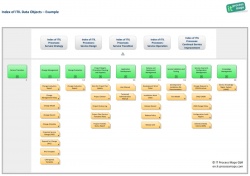
All terms related to ITIL (ITIL 2011, ITIL V3 & V2) and IT Service Management (ITSM)
| ITIL Glossary Terms |
The ITIL glossary provides you with definitions for the most important glossary terms and acronyms on the IT Infrastructure Library ITIL® (ITIL 2011, ITIL V3 & V2) and IT Service Management (ITSM) in alphabetical order.[1]
Look up all terms or browse alphabetically:
| 1 ... 9 |
| A | B | C | D | E | F | G | H | I | J | K | L | M | ||||||||||||
| N | O | P | Q | R | S | T | U | V | W | X | Y | Z |
ITIL Terms starting with P
For quick access, all ITIL terms and definitions starting with "P" are listed below.
Please click on one of the terms to see its definition or skip list and proceed to "Definitions".
- Pattern of Business Activity (PBA)
- PIR
- Post Implementation Review (PIR)
- Pro-Active User Information
- Problem
- Problem Categorization
- Problem Closure
- Problem Identification
- Problem Management
- Problem Management Report
- Problem Manager
- Problem Priority
- Problem Record
- Problem Report
- Process and Asset Valuation
- Process Architect
- Process Architecture
- Process Area
- Process Assessment Guideline
- Process Audit
- Process Benchmarking
- Process Design
- Process Evaluation
- Process Evaluation Program
- Process Evaluation Report
- Process Maturity Assessment
- Process Metric (KPI)
- Process Owner
- Project Charter
- Project Control
- Project Coordination
- Projected Service Availability (PSA)
- Projected Service Outage (PSO)
- Project History Log
- Project Management (Transition Planning and Support)
- Project Manager
- Project Plan (Service Transition Plan)
- Project Portfolio Status Report
- Purchase Order
- Purchase Request
Definitions
Pattern of Business Activity (PBA)
- Patterns of Business Activity (PBA) are workload profiles describing the demand for particular services.
- PBAs are an important tool used by Demand Management for anticipating and influencing service demand.
- → ITIL processes, ITIL Service Strategy > Demand Management
PIR
Post Implementation Review (PIR)
- The Post Implementation Review takes place after a Change has been implemented.
- It determines if the Change and its implementation Project were successful, and identifies opportunities for improvement.
- → Checklist Post Implementation Review (PIR)
- → ITIL processes, ITIL Service Transition > Change Management
Pro-Active User Information
- A notification to users of existing or imminent service failures even if the users are not yet aware of the interruptions, so that users are in a position to prepare themselves for a period of service unavailability.
- → ITIL processes, ITIL Service Operation > Incident Management
Problem
- A cause of one or more Incidents. The cause is not usually known at the time a Problem Record is created.
- → ITIL processes, ITIL Service Operation > Problem Management
Problem Categorization
- → ITIL sub-process, Problem Categorization and Prioritization
Problem Closure
- → Checklist Closure of a Problem
- → ITIL processes, ITIL Service Operation > Problem Management
Problem Identification
- → ITIL sub-process, Proactive Problem Identification
Problem Management
- → ITIL processes, ITIL Service Operation > Problem Management
Problem Management Report
- A report supplying Problem-related information to the other Service Management processes.
- → ITIL processes, ITIL Service Operation > Problem Management
Problem Manager
- → Roles within ITIL, Problem Manager
Problem Priority
- → Checklist Problem Priority
- → ITIL processes, ITIL Service Operation > Problem Management
Problem Record
- The Problem Record contains all details of a Problem, documenting the history of the Problem from detection to closure.
- → ITIL Checklist Problem Record
- → ITIL processes, ITIL Service Operation > Problem Management
Problem Report
Process and Asset Valuation
- An estimate of the value a process or other asset represents for the business.
- This value is an important input for Risk Analysis.
- → ITIL processes, ITIL Service Design > Risk Management
Process Architect
- → Roles within ITIL, Process Architect
Process Architecture
- An overview of all processes and process interfaces, used as a tool to make sure that all processes within an organization cooperate in a seamless way.
- The Process Architecture is part the Enterprise Architecture.
- → ITIL processes, ITIL Continual Service Improvement (CSI) > Process Evaluation
Process Area
- Process Area is a CMMI® [2] term with the following (CMMI) definition: “A cluster of related practices in an area that, when implemented collectively, satisfy a set of goals considered important for making significant improvement in that area”.
- In the context of ITIL this would mean that the top level processes such as (for example) Incident Management would be a Process Area. The Logging and Categorization of an Incident would constitute a Process within that Process Area.
Process Assessment Guideline
- A guideline describing the four most-often used approaches to evaluate the underlying service management processes: Process Maturity Assessments, Benchmarks, Audits and Process Reviews.
- → ITIL processes, ITIL Continual Service Improvement (CSI) > Process Evaluation
Process Audit
- → ITIL sub-process, Process Audit
Process Benchmarking
- → ITIL sub-process, Process Benchmarking
Process Design
- The description of a process including its in- and outputs, activities, and responsibilities.
- Process Designs are under the control of Process Management.
- → ITIL processes, ITIL Continual Service Improvement (CSI) > Process Evaluation
Process Evaluation
- → ITIL processes, ITIL Continual Service Improvement (CSI) > Process Evaluation
Process Evaluation Program
- The purpose of the Process Evaluation Program is to make sure all relevant processes and areas of the organization are subject to regular Process Maturity Assessments, Benchmarks, Audits and/ or Process Reviews, as appropriate.
- → ITIL processes, ITIL Continual Service Improvement (CSI) > Process Evaluation
Process Evaluation Report
- The results from a Process Maturity Assessment, Benchmarking, Audit, or Process Review, including identified shortcomings and areas which must be addressed by improvement initiatives.
- → ITIL processes, ITIL Continual Service Improvement (CSI) > Process Evaluation
Process Maturity Assessment
- → ITIL sub-process, Process Maturity Assessment
Process Metric (KPI)
- Process Metrics (Key Performance Indicators – KPIs) define what is to be measured and reported to help manage a process.
- → ITIL processes, ITIL Continual Service Improvement (CSI) > Process Evaluation
Process Owner
- → Roles within ITIL, Process Owner
Project Charter
- The Project Charter is a statement of the scope, objectives and participants in a project.
- It outlines the project objectives, identifies the main stakeholders, defines the authority of the Project Manager and the resources at his disposal, and lists any constraints and assumptions affecting the project.
- → ITIL processes, ITIL Service Transition > Project Management - Transition Planning and Support
Project Control
- → ITIL sub-process, Project Management - Transition Planning and Support#ITIL Project Management Control
Project Coordination
- → ITIL sub-process, Project Planning and Coordination
Projected Service Availability (PSA)
- A Document that identifies the effect of planned Changes on agreed Service Levels, based on the Forward Schedule of Change (FSC).
- → ITIL processes, Change Management - ITIL V2
Projected Service Outage (PSO)
- The Projected Service Outage (PSO) document lists any expected deviations from the service availability agreed in SLAs.
- → ITIL processes, ITIL Service Transition > Change Management
Project History Log
- A document recording important events during the course of the project, e.g. decisions, escalations and changes to the project scope.
- → ITIL processes, ITIL Service Transition > Project Management - Transition Planning and Support
Project Management (Transition Planning and Support)
- → ITIL processes, ITIL Service Transition > Project Management - Transition Planning and Support
Project Manager
- → Roles within ITIL, Project Manager
Project Plan (Service Transition Plan)
- A Project Plan (in ITIL also referred to as Service Transition Plan) is a formal, approved document showing the major deliverables, milestones, activities and resources for a project, used to guide both project execution and project control.
- → ITIL processes, ITIL Service Transition > Project Management - Transition Planning and Support
Project Portfolio Status Report
- The Project Portfolio Status Report is an overall summary of all planned or ongoing projects, listing key project data like milestones and current project status.
- → ITIL processes, ITIL Service Transition > Project Management - Transition Planning and Support
Purchase Order
- An order for purchasing items from a supplier.
- If the order is for an externally supplied Supporting Service it is accompanied by an Underpinning Contract defining service level targets.
- → ITIL processes, ITIL Service Design > Supplier Management
Purchase Request
- A request to purchase a service or a product from an external supplier, issued for example from Release Management during Service Build.
- Processing of a Purchase Request will generally proceed only if the requester also holds an approved budget for the purchase.
- → ITIL processes, ITIL Service Design > Supplier Management
Notes
[1] ITIL® is a Registered Trade Mark of the Cabinet Office in the United Kingdom and other countries. — IT Infrastructure Library® is a Registered Trade Mark of the Cabinet Office in the United Kingdom and other countries.
Source (partially): ITIL Glossaries/ Acronyms © Crown copyright. All rights reserved. Material is reproduced with the permission of the Cabinet Office under delegated authority from the Controller of HMSO. — The complete ITIL Glossary compiled by APMG in conjunction with the Cabinet Office and TSO is available for download from the Internet.
[2] CMMI® (Capability Maturity Model Integrated) is a registered trade mark of the Software Engineering Institute, Carnegie Mellon University.
ITIL Wiki › ITIL Glossary › ITIL Glossary: Terms starting with P
